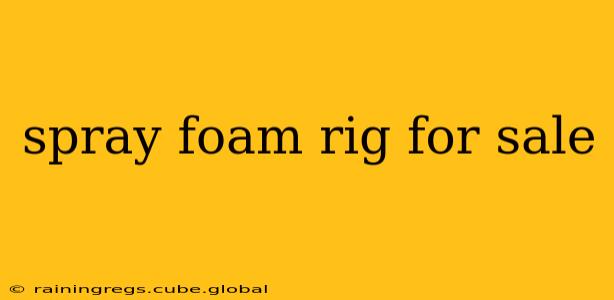The market for spray foam insulation is booming, and with it comes a high demand for reliable spray foam rigs. Whether you're a seasoned contractor looking to upgrade or a newcomer entering the industry, finding the right rig is crucial for success. This comprehensive guide will help you navigate the process of buying a used or new spray foam rig for sale, covering everything from understanding different types of rigs to asking the right questions before making a purchase.
What Types of Spray Foam Rigs Are Available?
Spray foam rigs come in various configurations, each designed for specific needs and job sizes. Understanding these differences is vital in choosing the best rig for your business.
1. Trailer-Mounted Rigs: These are popular choices for their portability and capacity. They offer a balance between mobility and the ability to handle larger jobs. Trailer-mounted rigs often have larger tanks and more powerful pumps, making them suitable for contractors with diverse projects.
2. Skid-Mounted Rigs: These rigs are typically more stationary, often found at larger, established businesses. They are known for their robust build and high output, ideal for high-volume applications. Their size, however, limits their portability.
3. Smaller, Truck-Mounted Units: Ideal for smaller businesses or those focusing on residential projects, these rigs are compact and easy to maneuver. While their capacity may be lower, their maneuverability is a significant advantage in tight spaces.
What Should I Look for When Buying a Used Spray Foam Rig?
Buying a used spray foam rig can be a cost-effective way to enter the market or expand your business. However, careful inspection is paramount.
1. Machine Condition and Maintenance History: Inspect the rig thoroughly. Check for signs of wear and tear, rust, leaks, and any damage to the components. Request a detailed maintenance history to assess the rig's overall health and potential future repair costs. Look for evidence of regular servicing.
2. Pump and Hose Condition: The pump is the heart of the system. Ensure it's in good working order and capable of handling the desired output. Inspect the hoses for cracks, damage, or leaks. Replacements can be costly.
3. Tank Capacity and Material: Consider the size of the tanks in relation to your typical job sizes. Larger tanks mean fewer refills, increasing efficiency. Assess the tank material for corrosion or damage.
4. Safety Features: Verify the presence and functionality of all safety features, including pressure relief valves, emergency shut-off switches, and proper grounding. Safety should always be a top priority.
What Questions Should I Ask the Seller?
Before committing to a purchase, ask the seller these crucial questions:
1. What is the age and make/model of the rig? This helps you research its capabilities and reliability.
2. What type of spray foam does it handle? (Open-cell, closed-cell, etc.) Ensure it meets your specific project requirements.
3. What is the average output of the rig? This determines efficiency and productivity.
4. What is included in the sale? (Hoses, guns, mixing equipment, etc.) Clarify what equipment is functional and included in the price.
5. What is the reason for selling? Understanding the seller's motivation can provide valuable insights.
6. Can I test the rig before purchasing? This is essential to ensure it operates as expected.
Finding Spray Foam Rigs for Sale: Where to Look?
Several avenues exist for finding spray foam rigs for sale:
- Online Marketplaces: Websites like eBay, Craigslist, and specialized equipment marketplaces often list used rigs.
- Equipment Dealers: Contact equipment dealers specializing in spray foam insulation equipment. They often have both new and used options available.
- Industry Forums and Groups: Online forums and social media groups dedicated to the spray foam industry can be valuable sources of information and potential leads.
What are the Costs Involved in Owning a Spray Foam Rig?
Beyond the initial purchase price, consider these ongoing costs:
- Maintenance and Repairs: Regular maintenance is vital for preventing costly breakdowns.
- Parts Replacement: Expect to replace hoses, seals, and other components over time.
- Insurance: Adequate insurance coverage protects your investment and liability.
- Fuel Costs: Factor in the fuel costs associated with operating the equipment.
By carefully considering these factors, researching options, and asking the right questions, you can find the perfect spray foam rig for sale to meet your business needs and propel your success in this growing market. Remember, investing in quality equipment and proper maintenance will pay off in the long run.
